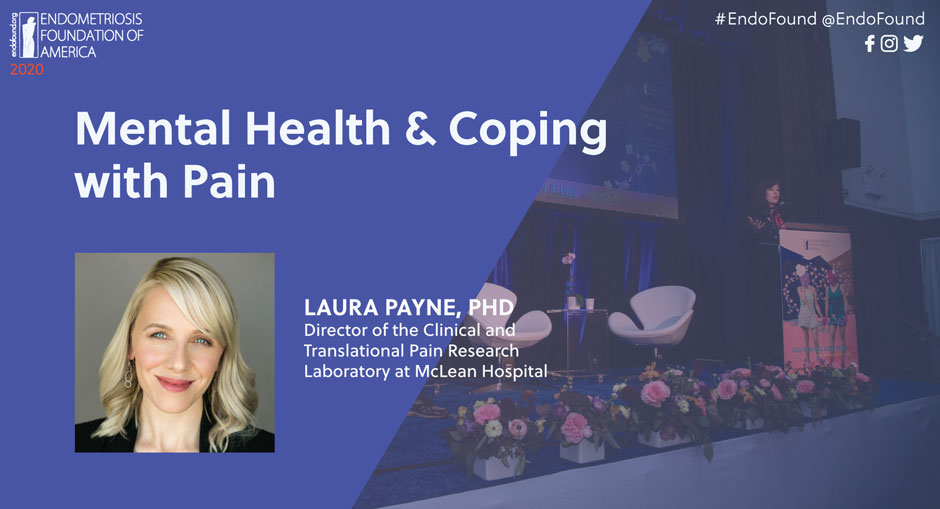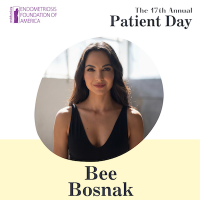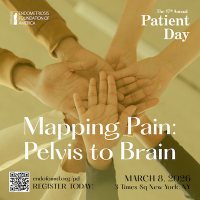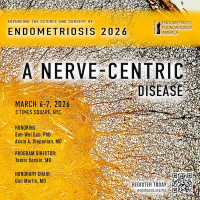Endometriosis Foundation of America
Virtual Patient Conference, October 16-18, 2020
Mental Health & Coping with Pain - Dr. Laura Payne
Margaret Caspler Cianci:
Here today, we have Dr. Laura Payne with us. Dr. Payne is a clinical psychologist and Director of the Clinical and Translational Pain Research Program at McLean hospital, Harvard University Medical School. Her research focuses on identifying neuro-biological behavioral and psychological biomarkers related to menstrual pain. Specifically, she is interested in identifying the factors that are associated with the transition from recurrent to chronic pain in girls and women. Dr. Payne also spoke at our spring webinar about coping with COVID, so we are delighted to welcome her back. Dr. Payne?
Dr. Laura Payne:
Thank you so much, Margaret, and thank you to everyone at the Endometriosis Foundation of America for inviting me to present today. I feel very honored to be able to share a little bit of my research and clinical experience, and I'm so happy to do so. So as I'm sure many of you know, endometriosis has a huge impact on women's lives. It's often associated with chronic and severe pelvic pain. And this seems to be one of the main factors that it contributes to difficulties in mental health, including depression, anxiety, and low quality, lower quality of life. We know that half of women with endometriosis experienced significant impairment in work and relationships, and of course that contributes to depression and anxiety as well. But we do know that pain is a really important component of this, even though endometriosis obviously has other effects as well, but it's the pain experience it seems to really be associated with mental health difficulties.
So one of the questions that you may have, and I think that many people have is that why do certain women experience more pain than others? And this really has been the big question in all of pain research for quite a long time. And what my research is looking at is trying to understand that. Why do some women have more pain and more impairment than others? So to illustrate what we know about pain and what our current understanding of pain is, I want to show a slide that describes, or that illustrates this. Would you be able to enable the screen sharing? Okay, here we go. I think, let me see here. It is not picking up on my... I'm going to try this again here in just a moment. So what we understand about pain is that the entire experience of pain takes place in the brain. So many of you may have experienced physicians or friends or family members who say your pain isn't real, or it's all in your head. And this is really not how we understand pain at all. Because whether you have cancer, whether you have endometriosis, whether you have broken bones, everybody has a different pain experience because there are so many different aspects of our experience that contribute to our own experience of pain, only one brings signals from nerves. So when we get some pain signals from nerves, it travels into the brain and that information is processed along with our own beliefs about pain, our expectation about whether something's going to be painful or not, our expectation that we're going to not experience pain, which is kind of a placebo. It determines our hypervigilance, whether we're attending to the pain, whether we're distracted or worried, also our mood and different aspects of the chemical and structural aspects of the brain. So all of this information, along with the signals from nerves, determine what our experience of pain will be. And this really helps us understand why people experience pain in different ways. And we know this from our, probably just everyday life that some people just, they can get into cold water and it doesn't bother them at all and other people are very sensitive to it. And this is actually one of the tasks that we use to evaluate pain is putting a hand in cold water. So having this understanding about how pain works in the brain allows us to then use and develop other ways of coping. And of course, because pain causes impairment in life, that is associated with depression. We also want to avoid pain. And so that can lead to anxiety, but what's another important component is that the pain pathways in the brain are very similar to the pathways for depression and anxiety.
So even on a neuro-biological level, there are a lot of similarities there and it makes perfect sense why somebody who experiences pain would also experience some of these other mental health issues. So the question is then what can we do about it? Well, chronic pain often requires a multidisciplinary approach and this can be true for endometriosis as well. Obviously, medical interventions and having a physician that is very attentive to your needs and providing the appropriate care is essential. This could be surgery or other procedures or medications. We also know that physical therapy, often focused on the pelvic floor, can also really help with pain and finding a physical therapist that specializes in pelvic pain can be a real help to help strengthen certain muscles and alleviate at least some pain. And then of course, there's psychotherapy and other mind body interventions. And I'm going to talk a little bit more about these different options, but all of these different types of approaches are important, and not one is going to be the complete answer. And so finding the treatment approaches that work for you and help alleviate pain and then resulting mental health struggles can be so important.
So there are some treatment interventions that are done more on a consistent basis, and these are things that you would do and expect to feel immediate relief. But these are things that over time can really be helpful for managing pain and we know this from clinical research. This includes meditation and relaxation. It's been one of the most widely studied interventions and not only benefits pain, but also benefits depression, anxiety and worry.
Also, yoga can be a very beneficial practice. Again, it has impact on pain and mental health issues. I think the most important thing is finding a practitioner that is trained in pain conditions, because when you're in pain, you need to have somebody who really understands exactly what is happening in the body and would not put your body in a position that was going to cause additional pain. We also know that even communicating your emotions can have an impact on pain and depression and anxiety. So if you're struggling on a particular day, being able to communicate that to somebody who's supportive, whether it's a partner or a family member or friend, or even just in the endometriosis community, can actually really help alleviate some of that pain. Exercise is very important, but there's a caveat to this in that as with all of the activities that may be helpful for pain, what's really important is that you don't overdo it. So there's this important concept that we call activity pacing. And that means on each day, determining the level of activity that is appropriate for you, and that isn't going to... You're not going to push yourself so much that you're in additional pain, but that's something that you feel active and engaged in, but not pushing yourself too far. And so it's really also trying to understand that for yourself, like where is that limit? We also know that massage and acupuncture can be helpful for pain, as well as depression and anxiety. And of course, different medications prescribed by a physician that really understands pain can be a tool. So there are many different tools that you can use that will address the pain, as well as some of these other mental health issues, because we know that mental health is so closely tied to the experience of pain.
I'll also speak a little bit about cognitive behavioral therapy, because that's what I do. And that's a type of psychotherapy that is a little different than just a regular talk therapy. It's more present moment focused and it's skills-based. So usually at each session, you're learning a new skill, learning how to apply it to your experience and then practicing the skill in between sessions. I don't have time to go over every detail about it, but the essence of cognitive behavioral therapy is first, really understanding the relationship between your thoughts, your feelings, especially your physical feelings in your body and your behaviors, because we can see how if you may think of something in a very kind of negative way, that's going to affect how you feel physically, and it's going to affect what you do behaviorally. And so trying to understand that relationship will help you begin to shift some of those different things.
One of the coping strategies that we could just generally call healthy thinking is trying to identify some of the thoughts you may be having either about pain or just in general, whether they're negative, anxious thoughts. So identifying what you're worried about or what you're thinking about that's negative, trying to look at the evidence in your experience to see if that is accurate. So if you're worrying that you can... You're feeling kind of a pain flare up and the thought might be, "Well, this is never going to get better." That might be a common thought that people experience, you can take a step back and say, "Okay, well, how many times has this actually happened to me? And has it always stayed at that level? Have I gotten better? Even if it's not pain-free, have I been able to come back from that?"
And usually, the answer is yes. So you can help challenge some of those thoughts. And then you can also consider how you would cope with this kind of worst outcome in your mind. What would you do? How would you cope with this level of pain that you were experiencing if it persisted for days or even a week without any relief? What are the ways that you could get support, even if you couldn't change the pain? And separate from that, we know that distraction can help with pain, at least in the short term, and identifying and dealing with life stressors can also help. This is not something that can be done immediately, but if you find yourself in a... there's a stressful aspect of your job, or there's a stressful aspect of friendship or relationship trying to work on and changing those stressors so that you have overall less stress in your life can be helpful.
The last thing I want to share is just a slide that has just a few resources on it. Give me a second here. So these are two professional organizations that I am a member of, and I'm very much involved in. The International Pelvic Pain Society is a wonderful group of both treatment providers and researchers focused on helping alleviate pelvic pain, primarily for women, but for men as well. And on the website, you can find a lot of information as well as a small referral database, but providers from physical therapists to psychologists to pain physicians that may be in your area, and it's a really useful website. And the second one is the Association for Behavioral and Cognitive Therapies. This organization is focused on promoting cognitive behavioral therapy and really getting the information out there to people who need it. And so there is a lot of information on there for pain, for depression, for anxiety, lots of different types of anxiety. And also there is a find a therapist referral database there that you could explore for somebody that may have expertise in what you are looking for help with. And that is my presentation. And I'll turn it back to you, Margaret.
Margaret Caspler Cianci:
And we have a number of questions that have been coming in. So thank you very, very much. You know, one of the things that we've heard repeatedly for the last two days is that women tend to bear their pain better, or they don't talk about their pain as much as they should. And that leads to all kinds of emotional feelings as well. So one of the questions that we have comes from Heather, and Heather wanted to know what is a good way to handle feelings of guilt and shame that can be associated with having endometriosis, and what impact will it have on the desire or ability to be intimate and eventually have children?
Dr. Laura Payne:
Yes, I think guilt and shame is an emotion that comes up a lot, especially for women when they are limited in some way in the role that they've expected for themselves or that other people expect. I think using some of the healthy thinking strategies can be helpful for challenging that guilt and shame. Guilt signals that we've done something wrong, and is this really a situation where you've done something wrong or is this something that you're also struggling with and wanting to improve? Because in that case, the guilt would not be an adaptive emotion in that situation. So we'd want to challenge it. But I think, again going back to communicating, especially with partners, this is such an important, important thing to do, especially when you're struggling, either with intimacy or potential fertility issues down the road, having this good communication with your partner and also being receptive to what they feel, it can really, really help. I can say that for sure.
Margaret Caspler Cianci:
Thank you. So another question that we have sort of follows up on that, and it's from Elva and it's very interesting and I think something that happens probably to a lot of endo patients. So she has an incredibly wonderful support group, but she just recently had a hysterectomy and a bowel resection. And all of the people in her network keep saying, "Do you feel your endo pain is gone?" How can she help them understand that she's in a different discomfort post-op, and that just because she's had surgery, she's not feeling instantly better, but she doesn't want to be negative. And I think also there's a lot of well-meaning people out there, whether it's parents or partners and should we maybe change the dialogue with them a little bit too? So it's a good question.
Dr. Laura Payne:
Absolutely. And this goes back to how we understand pain now, which I think is not the kind of common understanding. The common understanding is that you have a medical issue and that means you have a justified pain. And if you remove that medical issue, then you shouldn't have pain anymore. And that is an incorrect understanding of how we experience pain. So without being negative, I think it's possible to communicate a little bit about what pain is because pain is not just about whether you have endometrial tissue and it's this severe or that severe. It's really about, it's the individual's experience. And it can't be just changed necessarily because of a particular intervention. And so it's not an easy thing because I think a lot of our culture understands pain in this way. It's either medical or it's not. And hopefully being able to communicate that, this is an ongoing process of managing this and I'm sure that procedures do help, but it's not the only answer. And so you can still be struggling even if you've had the absolute best surgical procedures, medical procedures and medication. It's an ongoing management.
Margaret Caspler Cianci:
Absolutely, and which is why we constantly say that endometriosis is a chronic disease. So it's a very valid reason. Another question that we have has come in and it's that you mentioned in addition to neuro signals, that there are other factors that contribute to pain. How can you specifically address psychological factors through CBT that contribute to pain? And I think maybe just a little bit more of a general description of CBT would be helpful as well.
Dr. Laura Payne:
Yeah, right. And that's, I think one of the primary ways to address those other factors is through cognitive behavioral therapy. So cognitive behavioral therapy often involves learning a lot more about what your experience is, and that includes the thoughts that arise when you start to experience a painful sensation or when you experience a stressor or something kind of triggers an emotional reaction, and it's understanding your thoughts, how those thoughts impact how you feel, and then what you do as a result. And throughout the process of therapy, you're working to try to change kind of each of those components. So you're working on challenging those anxious or very negative thoughts using some of the strategies that I mentioned, working on the physical sensations, and that could include through exercise, through stretching, through relaxation, whatever the tool is that ends up working for you.
Dr. Laura Payne:
And the point is to experiment to find what works for you, because not everyone is the same. And then it's also working on the behaviors. So oftentimes when we think very negatively or we think like, "I'm going to go out and it's just going to be terrible, and I'm not going to have fun." We would want to stay home. And we work on challenging those behaviors and trying to engage in new behaviors. So in that example would be going out or at least going out for a little bit of time. And again, that's the activity pacing. You can't push yourself too much, but that is how cognitive behavior therapy actually does change some of those pathways and why it's so important to include these other complimentary treatment approaches when you're dealing with chronic pain.
Margaret Caspler Cianci:
Thank you so very much Dr. Payne, and thank you for the different elements of the toolbox as well. And we really appreciate you sharing those resources. For everyone who has joined us, you will be receiving access to all of our sessions. And that will include Dr. Payne's resources as well. Dr. Payne, thank you so very much. We really appreciate it. Of course, we could continue talking for another hour on this subject, but hopefully we'll have you back for another webinar.
Dr. Laura Payne:
I'd love to. Thank you so much.
Margaret Caspler Cianci:
Thank you.










